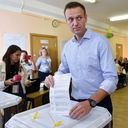How Navalny became Putin's biggest political foe and an advocate for a "normal" Russia

Alexei Navalny, a fierce voice for Russian democracy and critic of President Vladimir Putin's authoritarian rule, died on Friday after languishing in Russia's brutal penal system for over 35 months, according to authorities.
The big picture: Navalny's death solidifies the uncertain future of the Russian opposition movement he helped organize to transform Russia into what he described in 2018 as "a normal country."
- It also adds to a growing list of prominent Putin opponents who have died under suspicious circumstances, echoing the 2015 killing of Boris Nemtsov, a liberal politician and the most vocal critic of Putin at the time.
Catch up fast: Navalny suddenly lost consciousness and died while walking in the Arctic penal colony he was transferred to in December, Russian authorities claimed on Friday.
- His representatives have said they had no way to confirm if or how Navalny died, that they do not trust Russian authorities and that if he died, they believe he was killed in prison.
- Navalny's death came just weeks before Russians vote in the country's 2024 presidential election, which will undoubtedly keep Putin in power through 2030.
Zoom out: Navalny went to prison in 2021 shortly after surviving a Kremlin-linked assassination attempt with a military-grade nerve agent called Novichok, which has been used in other attacks carried out by the Russian security services.
- After he went to prison, his allies repeatedly warned he was being held in appalling conditions while being denied medical attention.
- Navalny was last seen alive on Thursday in a court hearing. Attending by video feed, he was seen joking and laughing with a Russian judge.
- In his last statement on social media, Navalny said he had been given "15 days in a punishment cell," which was his fourth time in a such a cell in less than two months.
How Navalny gained prominence:
Navalny, a former lawyer, gained standing among Russian opposition circles by exposing rampant malfeasance within Putin's inner circle and founding anti-corruption organizations.
- He instigated several anti-government demonstrations over the years, including a nation-wide protest in 2021 to demand his release from prison.
- Navalny also ran for political office multiple times. His 2018 presidential run ended after he was officially barred from competing by Russia's election commission, and he finished second in the 2013 Moscow mayoral race but was denied a recount for a second-round runoff vote.
What Navalny believed:
While Navalny consistently rallied in support of fair elections and against Putin and hypocrisy and corruption among Russia's elite, his stance on other political matters shifted over time.
- In 2007, he was expelled from Russia's oldest liberal party for his participation in nationalist rallies and support for nationalist policies.
- Though his nationalist leanings continued to shadow him, his positions on immigration, Russia's imperial ambitions and other issues became more nuanced over the years, culminating into his opposition to Russia's invasion of Ukraine.
- Despite his opposition, Navalny, who was half Ukrainian, has been distrusted or even despised by many in Ukraine for his previous comments on Ukrainian culture and Russia's occupation of Crimea.
Why Navalny was arrested:
At the time of his death, Navalny was facing multiple decades in prison from an array of convictions denounced internationally as being political retaliation achieved through sham trials.
- After surviving the 2020 assassination attempt, Navalny went back to Russia and was immediately arrested for allegedly breaking parole conditions from a previous 2013 conviction while recovering in a hospital in Germany.
A court sentenced him to 2.5 years in prison for the alleged parole violation, and just months later he received a nine-year sentence on fraud and contempt of court charges.
- In August 2023, a court gave him a 19-year sentence for creating groups like the Anti-Corruption Foundation that Russian authorities found to be "extremist" in nature and other extremism-related crimes.
- His allies argued Russian authorities were retroactively criminalizing his anti-corruption foundation after it revealed corruption.
The retaliation was not limited to Navalny, as several members of his team have been arrested and sentenced, including some of his lawyers.
- The Kremlin dismantled human rights organizations, forced independent media and social networks out of the country, arrested journalists and thousands of people involved in demonstrations.
- Its crackdown has only intensified with the invasion of Ukraine.
What Navalny said about his death:
If he died as a result of his activism, "it means we are incredibly strong," Navalny said in 2022 while speaking of the Russian opposition movement.
- "We don't realize how strong we actually are," he added. "The only thing necessary for the triumph of evil is for good people to do nothing. So don't be inactive."
Go deeper: Navalny's death electrifies Capitol Hill debate over Ukraine